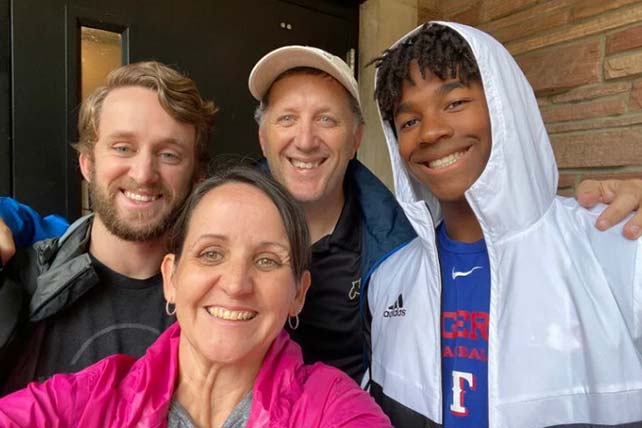(RNS) — For Shelley Park, it was the 2019 killing of Atatiana Jefferson by a Texas police officer that transformed her from a casual observer of U.S. racial history to teaching about it in hopes of fostering cross-racial understanding.
For David Park, it was the need to learn from Black friends how to have “the talk” with both of their children: their biological son, Samuel, and his younger adopted African American brother, Jeremiah, as they grew closer to the age when they could be subject to a traffic stop.
For four years, the white couple from the Dallas suburb of Carrollton has been leading free classes called “Let’s Talk Race: A Beginner’s Guide to Conversations About Race,” in which they aim to teach people — primarily white Christians — the biblical, historical and societal aspects of race in America.
“I had been following all these people of color on Instagram and really learning and reading books,” said Shelley, who grew up as a missionary kid in the Philippines, in an interview with Religion News Service. “Many of them said, ‘We’re just tired,’ and ‘White people, we need you to get your people.’ And it was like the Lord said very clearly, as I was processing Atatiana’s murder, that it was time to do something.”
RELATED: Four Times God Powerfully Subverted Racism in the Bible
The Parks, who are nondenominational Protestants, developed the course, adapting it from a presentation by her father, a retired minister, and continue to offer five weekly hour-and-a-half online classes. Last year they created LTR Ministries Inc., a not-for-profit with a multiracial governing board, to give white people and churches a starting point on racial reconciliation.
“We’re not really helping you across that bridge or down that journey,” said Shelley, during a recent podcast episode of Jemar Tisby’s “Fighting Racism” series done in partnership with RNS. “We’re saying: Hey, you need to go take that journey. You need to go cross that bridge and we’re going to give you some tools to help you do that and do it well.”
They recommend books, movies, videos, podcasts and people to follow on social media to “expand your echo chamber.” Though they note they do not agree with every word written or spoken in their lists of resources, they say “it is good for us to learn to listen to voices who look at and see the world differently than we do.”
Their curriculum has addressed the “Curse of Ham” — a story in the Book of Genesis that some have used to support the idea that some races are subordinate to others — and food deserts that have left communities without nearby grocery stores. They deal with both individual racism, urging their students to leave the course ready to “sit and listen and to believe” their friends of color, and systemic racism, such as redlining, a form of housing discrimination.
They kept the virtual classes small, with about 15-20 people from around the country who heard about them by word-of-mouth, said Shelley, 51, who studied the Civil Rights Movement as a college student.
In 2020, amid COVID-19 shutdowns and protests sparked by the killing of George Floyd by a Minneapolis police officer, they reached more than 300 people through the course, offering as many as four classes a week. As controversies around critical race theory mounted, interest waned but they say registrations have increased more recently and they have five classes set for this fall, to be led by several different facilitators.
David, 52, who recently left a 27-year corporate career to become a seminary student at nearby Abilene Christian University Graduate School of Theology, said most class participants have a positive “aha moment” but a few have gotten angry and given up on the class after a session or two.
The Parks hope people leave the class feeling a responsibility to take action individually and with their churches, and not leave the work up to others, including the Black churches whose leaders have often publicly called for addressing racism. The couple recommend participants move on to interracial groups where they can have discussions and take actions, such as Be the Bridge, a nonprofit that aims to create “anti-racist bridge-builders,” and Threaded, an organization that encourages collaborative community action by a diverse group of churches.

